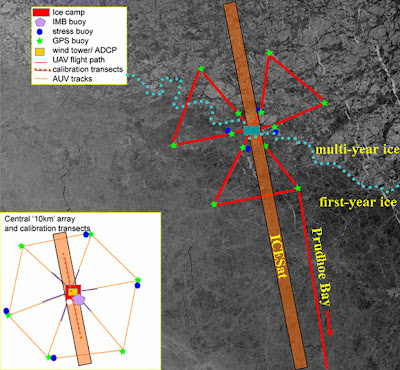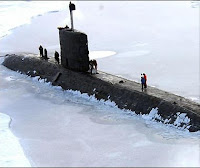This is the last day on the ice, with the majority of the people returning to terra firma (Prudhoe/Fairbanks).

copyright Los Angeles Times article






Note added a few hours after the original post: I was the lucky recipient of the first Iridium call from the ice camp. Cathy and Robert made it right up, with almost no layover in Deadhorse. They are well, and excited, and things at the camp are going well. They are basically unpacking and setting themselves up. With such a wonderful instant feedback from the polar cap, I vow to not speak negatively again of the Iridium system ... !
The caller ID stated "out of area."
The weather is nice, some wind, and -20F; the Sun is low in the sky. The flight was interesting, and so was apparently the landing. But details of that will have to wait to when a DVD or CD makes it out of the camp, and the info to me.
 Caption for figure above: Location tracks of the moored ice buoys. The diameter of the outer formation is roughly 200 km. The formation participates in common drift, but also in subtle changes in relation to each other (stress/strain/divergence).
Caption for figure above: Location tracks of the moored ice buoys. The diameter of the outer formation is roughly 200 km. The formation participates in common drift, but also in subtle changes in relation to each other (stress/strain/divergence).


"There was a particularly long and detailed section on frostbite and hypothermia which left in all of us the harsh details of what happens if you freeze then thaw (swollen digits) or refreeze your digits (black and you lose them). The training was sufficient to teach us all to really watch our fingers and toes to make sure that we really take special care of them. Nothing like seeing big screen photos of what happens when you don't monitor the health of your fingers and toes. It really snaps you into shape about taking care of yourself."
"After a big banquet at a very nice local restaurant, we all got in the van and went to the annual ice sculpture competition which is an international event hosted in Fairbanks. The imagery was spectacular. The weather is actually quite nice here. It was near 20F during the day and only got down to about 5F while at the Ice Park."

| Sunday | Monday | Tuesday | Wednesday | Thursday | Friday | Saturday |
| 1 Twi: 5:19 Sunrise: 6:39 Sunset: 20:57 Twi: 22:17 Moonrise: 20:20 Moonset: 6:48 |  2 2Twi: 5:12 Sunrise: 6:33 Sunset: 21:02 Twi: 22:23 Moonrise: 22:30 Moonset: 6:10 Full Moon: 9:16am | 3 Twi: 5:05 Sunrise: 6:27 Sunset: 21:07 Twi: 22:29 Moonrise: none Moonset: 5:24 | 4 Twi: 4:58 Sunrise: 6:22 Sunset: 21:12 Twi: 22:36 Moonrise: 1:28 Moonset: 3:53 | 5 Twi: 4:51 Sunrise: 6:16 Sunset: 21:17 Twi: 22:42 Moon: down all day | 6 Twi: 4:43 Sunrise: 6:10 Sunset: 21:22 Twi: 22:49 Moon: down all day | 7 Twi: 4:35 Sunrise: 6:04 Sunset: 21:27 Twi: 22:56 Moon: down all day |
| 8 Twi: 4:28 Sunrise: 5:58 Sunset: 21:33 Twi: 23:04 Moon: down all day | 9 Twi: 4:19 Sunrise: 5:53 Sunset: 21:38 Twi: 23:11 Moon: down all day |  10 10Twi: 4:11 Sunrise: 5:47 Sunset: 21:43 Twi: 23:19 Moon: down all day Last Qtr: 10:05am | 11 Twi: 4:02 Sunrise: 5:41 Sunset: 21:49 Twi: 23:28 Moon: down all day | 12 Twi: 3:52 Sunrise: 5:35 Sunset: 21:54 Twi: 23:37 Moon: down all day | 13 Twi: 3:42 Sunrise: 5:28 Sunset: 22:00 Twi: 23:46 Moonrise: 7:40 Moonset: 14:01 | 14 Twi: 3:32 Sunrise: 5:22 Sunset: 22:06 Twi: 23:56 Moonrise: 6:42 Moonset: 16:49 |
www.sunrisesunset.com/custom_srss_calendar.asp, 146 W 73 N GMT-8